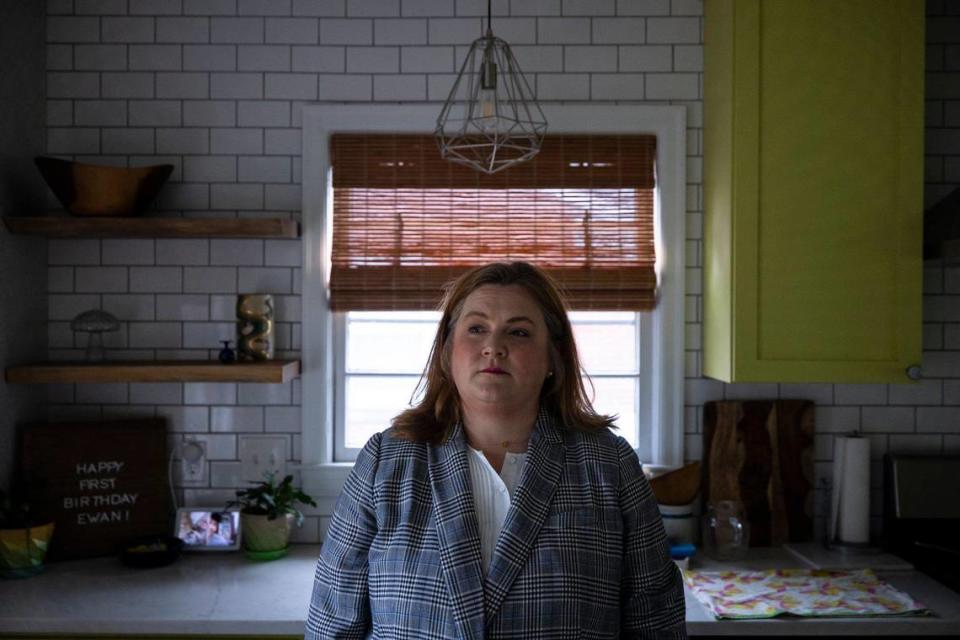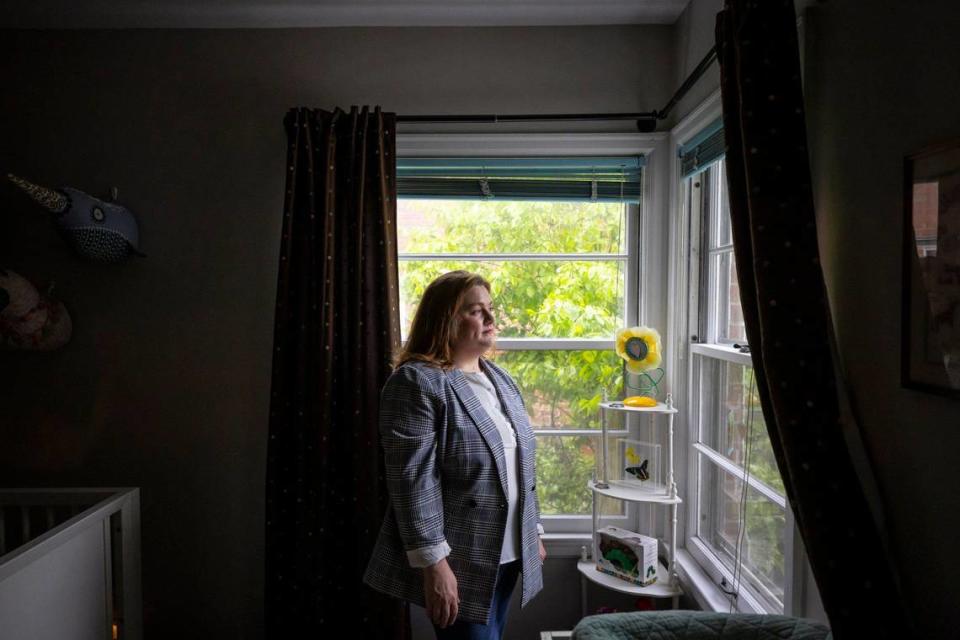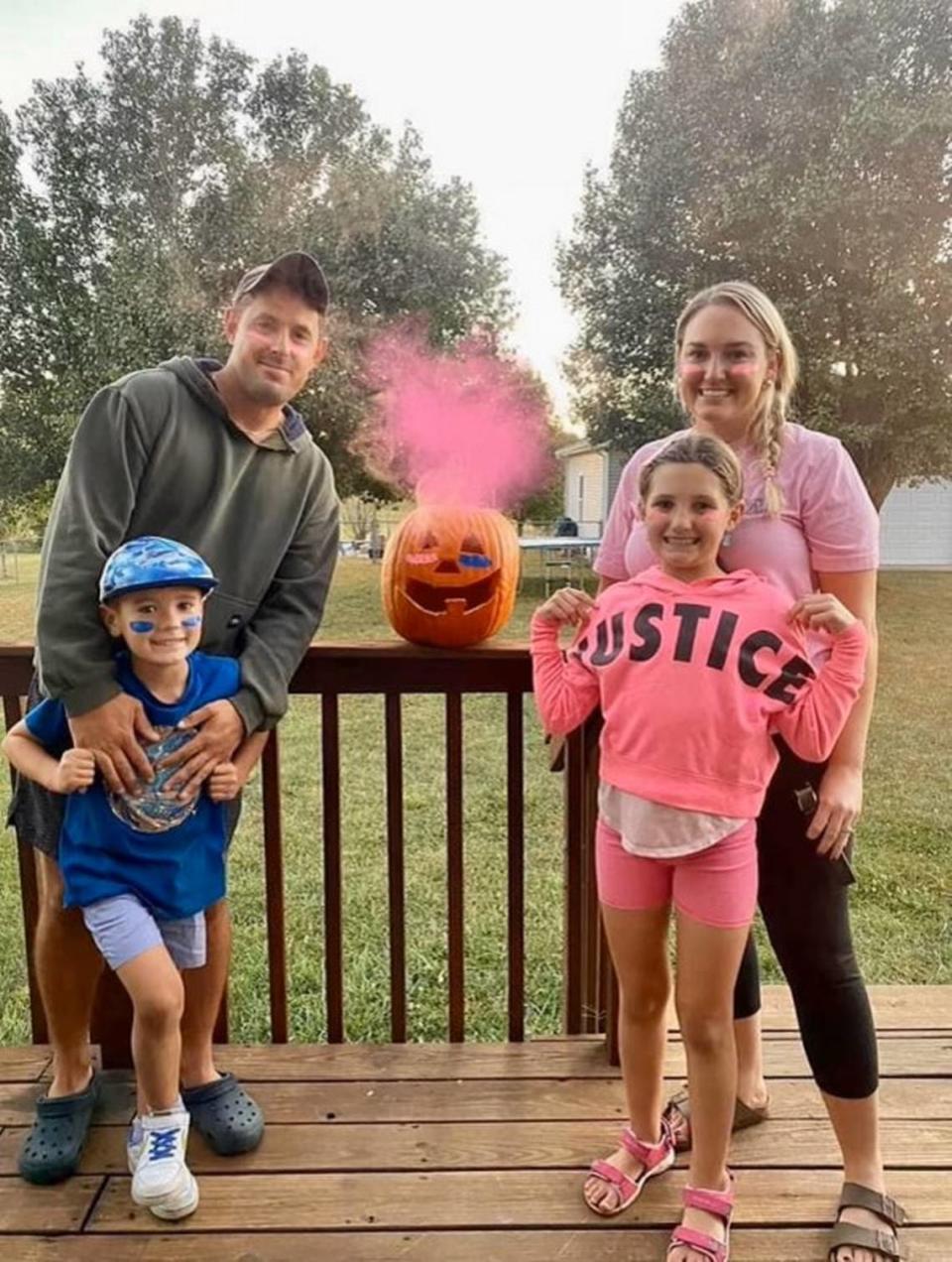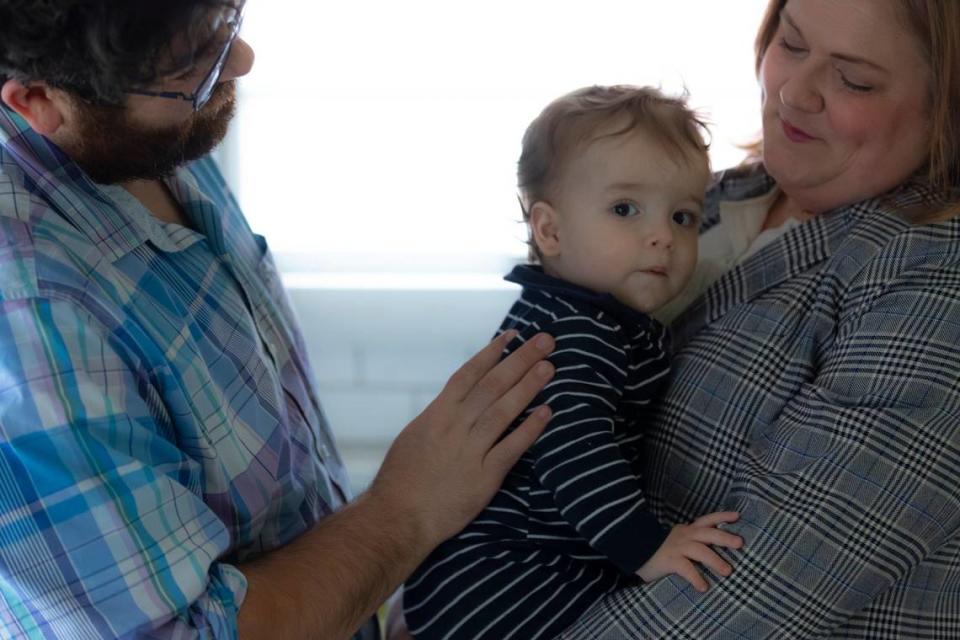A KY lawmaker had a nonviable pregnancy. State abortion bans made her loss more agonizing
Almost a year to the day after Rep. Lindsey Burke gave birth to twins — one dead, the other alive — she walked out of a legislative committee meeting in Frankfort.
Burke, one of three Kentucky Democrats who walked out that day, was protesting a bill she said shamed the choice to abort a nonviable pregnancy.
Burke herself made that choice in October 2022 when she and her husband ended a pregnancy they’d planned for and wanted in order to protect the life of their second child. For her family, Burke was exacting what control she had over an otherwise impossible situation.
The decision to walk out of the committee meeting March 7 in response to Republican Rep. Nancy Tate’s House Bill 467, the “Love Them Both Part II Act,” was one she saw similarly: Exacting a sense of control over a situation in which she had little.
Republicans hold a veto-proof majority in both legislative chambers, rendering Democrats virtually powerless. Burke knew that this committee — made up of four Democrats and 15 Republicans — was going to advance the bill regardless of her act of protest or the will of her Lexington constituents.
In the hallway outside the committee room, Burke told a gaggle of reporters the bill was “an insult to grieving parents everywhere.”
In the nearly two years since Kentucky Republicans’ hard-fought efforts to ban abortion became law — a measure with no exceptions for rape, incest or nonviable pregnancies like Burke’s — the conversation over reproductive health care has only become more divisive.
Burke has shared snippets of her pregnancy and abortion publicly, but never in complete detail. On a chilly Friday in February, she shared her story for the first time with the Herald-Leader.
“I chose to be public about our struggles because I’ve learned that being authentic is less isolating than hiding my pain and humanity,” Burke said.
Relief, then dread
Burke and her husband, Spencer, knew they wanted kids before they married. But conceiving proved difficult. After the COVID-19 pandemic thwarted their efforts to foster, they decided to try in-vitro fertilization.
Burke underwent her first IVF egg retrieval in late 2021, right around the time she put her name in to run for public office.
She’d gotten pregnant for the first time in February 2022, but miscarried about eight weeks later.
The whiplash from swelling excitement to immediate loss was hard.
Burke was 38 at the time she was diagnosed with “recurrent pregnancy loss,” according to her medical chart, which she shared with the Herald-Leader.
“The day we found out, we probably disrupted the entire medical office,” Burke said. “Just both of us wailing.
“My husband had a panic attack.”
As is sometimes the case with miscarriages, her body didn’t recognize it right away; her gestational sac was still growing, but there was no longer a developing fetus inside it.
Burke said her doctor explained her three options: expectant management, which is to wait until her body realized it was no longer pregnant and miscarry on its own – a process that could take weeks; a dose of mifepristone and misoprostol, common abortion medication to usher the process sooner and in a more controlled way; or schedule a dilation and curettage abortion to remove the pregnancy tissue physically, allowing her to try and conceive again sooner.
It was spring 2022, and Burke was campaigning for a May primary election.
“I can’t be out shaking people’s hands at an event and then start bleeding,” she remembers thinking. “That’s not what I want for myself.”
She and Spencer chose a D&C.
“The certainty of knowing when that nightmarish experience was going to end, to have a day and time in mind, that gave me more peace,” she said.
“To feel like I had some control in a situation that was very much out of my control.”

Abortion, at that time, was still legal in Kentucky and Ohio.
Burke had received most of her IVF care at the Institute for Reproductive Health in Cincinnati, so that’s where she scheduled the procedure.
She had the D&C April 12, 2022.
On May 17, she won her primary. She was sworn in as a state representative in January 2023.
Burke’s next IVF attempt had to be timed in concert with her work as a new lawmaker. If she got pregnant mid-summer, she could be present for her first regular session, January to March 2023, which would wrap up in time for her due date.
But the medical landscape for her second egg retrieval — and the full range of care she could need should something go wrong — looked very different than the first a few months earlier.
It was July 2022.
Just a few weeks earlier, Roe v. Wade, which for 50 years prevented states from banning abortion entirely, had been overturned by the U.S. Supreme Court.
This historic ruling gave states free regulatory rein over abortion laws. In Kentucky, two abortion bans simultaneously took effect: a trigger law banning abortion except in medical emergencies, and six-week ban, or fetal heartbeat law, outlawing abortion after the first flickers of fetal cardiac activity.
These narrow allowances permitted under state law, still in place today, do not legally allow for doctors to provide the full gamut of care for nonviable pregnancies.
For Burke’s second IVF round, doctors transferred two embryos, and Burke became pregnant with twins.
Her mentality was glass half-full. Two embryos increase the chances of at least one surviving, she thought. Maybe she would only have to go through one pregnancy in order to get two kids.
“I was focused on the two embryos increasing the likelihood of success, as opposed to it increasing the likelihood of problems,” Burke said. “I was fixated on the achievement part, not the pitfalls.”
Burke’s health care providers were more realistic.
“They warned us transferring two embryos doubles the risk of everything, because each child has its own likelihood of issues,” she said.
Early genetic testing results raised no alarms. But Burke couldn’t shake what she called an “existential dread” that loomed after the shock and grief of her first miscarriage.
That dread dampened a bit with her first ultrasound, when she saw both fetuses moving on screen. While her doctor noted that Twin A was significantly smaller than Twin B, at a follow-up appointment a week later, Twin A had caught up in size. Both were progressing as they should.
IVF treatment and pregnancies, especially for someone Burke’s age — she would turn 39 during her pregnancy — are highly medicalized because they are higher risk. From the get-go, she had multiple providers and specialists checking her and her pregnancy’s progress.
This also meant she was more familiar with what to expect, and more adept at spotting abnormalities.
At a 12-week ultrasound, a sonographer again noted the size disparity of her twins. This time, she gave Burke a print out of the sonogram.
“Like any new parent, I spent the entire weekend staring at them,” Burke said. “And I could tell Twin A has too much space between his spine and the back of his head.”
The following week, in mid-October, at another ultrasound, Burke wasn’t watching the screen, she was watching the sonographer.
Something wasn’t right.
“You could just see it on her face,” Burke said.
Burke’s doctor was called in. She heard the words, “extremely concerning” and “unusual,” then a void of sound.

In her notes, Burke’s provider at Baptist Health, Dr. Karen Playforth, wrote that the “ultrasound today is very concerning.”
“The following structures appear abnormal: Cranium. Neck. Heart. Abdominal wall. Bladder. Spine. Legs. Skeleton,” she wrote. Dr. Playforth and Burke’s referring physician both declined to be interviewed for this story.
Twin A, whom Burke had already named Ezra, had a series of birth defects and diseases, including a condition called a cystic hygroma. It’s a bulge at the base of the head and neck that often portends other serious conditions.
“To hear all these things very kindly but bluntly: Your child doesn’t have a spine below his shoulders. He has one or two extremely rare diseases, and the symptoms of that disease are his heart is outside his body, his bladder is outside his body, his head is misshapen, there could be something wrong with his brain, there’s something wrong with his legs, and he probably won’t make it to birth,” Burke said.
“I’m sitting over here trying to process that, thinking that’s the whole story,” she said.
“But then the doctor says, ‘And that’s the problem for Twin B,’” whom Burke and her husband had named Ewan.
Burke remembers the room sounding empty and hollow except for the doctor’s voice.
She learned that Twin A was not viable. He would not survive on his own, and without intervention, she would almost certainly miscarry.
This is where it became tricky, Dr. Playforth told her.
Allowing her pregnancy with Twin A, which was near 13 weeks, to continue progressing toward its inevitable end was a fine choice. But when her body miscarries, it will likely also try to expel her healthy twin, too, before the pregnancy has reached full term, forcing her into early delivery and potentially jeopardizing his health, too.
To avoid this likelihood, Burke would need to terminate Twin A to better ensure Twin B would survive – a specialized but evidence-based procedure known as “selective fetal reduction.”
“We talked about waiting to see if Twin A would pass on its own versus selective reduction of Twin A as early as possible, to minimize the risks to Twin B,” Playforth wrote. “They would like to proceed with the latter choice.”
It was October 14, 2022. Ending a pregnancy, except in emergency situations that threatened a pregnant person’s life, was illegal under Kentucky’s trigger law, and Burke’s life wasn’t immediately in danger.
This meant Burke could not get a legal abortion in Kentucky under a doctor’s care.
Complicating her circumstance further, she had to maneuver around abortion limitations in other states. And the more time she spent allowing her body the option to miscarry only increased the chances of Twin B being impacted.
Burke’s doctor told her to move fast. She provided suggestions of specialists in North Carolina and New York.
While her doctor offered as much help as she could, as other women in these scenarios have told the Herald-Leader, it fell to Burke and her husband to cold-call health care providers.
‘Much of a decision at all’
While public opinion favors increasing exceptions to the state’s strict ban, Republicans have not added any.
A Louisville Republican filed a bill to increase state exceptions this session, but for the second year in a row it was ignored by fellow GOP lawmakers and did not receive a committee hearing.
Groups have tried to overturn the ban by challenging it in court, but that avenue remains particularly difficult: Kentucky has made it harder than virtually any other state to lob a legal challenge.
Kentucky’s abortion bans make an otherwise evidence-based medical procedure like Burke’s a crime to provide.
In turn, women facing these complicated medical circumstances who’ve spoken with the Herald-Leader, including Burke, say they feel gaslit. The law — and bills like Tate’s HB 467 — imply that abortion in any circumstance that isn’t an emergency should be unthinkable.
But what if a woman and her doctor agree that abortion is a more humane option?
“I really don’t feel like I had much of a decision at all,” said Rachael Hilton, 34 of Rineyville, who said current bans forced her to carry her nonviable pregnancy until she miscarried at 24 weeks, two days after Christmas in 2022.
Hilton and Burke met each other in a Facebook group for expectant moms.
The two women later learned Twin A, Ezra, and Hilton’s daughter, Charlotte, had both been diagnosed with cystic hygromas. Both were given less than a 5% chance of surviving.
Charlotte was also diagnosed with Turner syndrome, which is when a fetus has a partial or missing X chromosome, and fetal hydrops, a buildup of fluid in the tissue and organs.
Hilton’s choice to continue carrying her pregnancy increased the risk to her own health, her doctors told her. Charlotte’s fetal hydrops threatened Hilton with developing Mirror Syndrome, which is when a pregnant person, like their fetus, also begins retaining fluid.
Hilton said she would have terminated her pregnancy earlier, but she didn’t have a reasonably accessible way of getting that medical care.
At the time, the closest location still legally offering abortions was Ohio. Hilton and her husband, who’s active duty military, would’ve had to travel 150 miles to Cincinnati. And to do that, they would have had to call in family from out of state to watch their two kids.

This inconvenience, coupled with out-of-pocket costs and seeing an unfamiliar provider to undergo a new procedure, felt too intimidating for Hilton.
“I felt like I really didn’t have any other option,” she said.
Hilton was induced early only because she’d naturally miscarried, and there was no longer a fetal heartbeat.
She was able to hold her daughter after birth. Weighing one pound and three ounces, the hydrops had altered the way her daughter looked; her skin was gelatin-like. She seemed too feeble and fragile to touch, Hilton remembers.
“I thought that by getting to hold her that, while sad, it would help provide me with some closure,” she said. “But it ended up being a very traumatizing event.”
Tate’s bill, which did not pass this session, would’ve required health care providers to refer patients with nonviable pregnancies like Burke’s to consider “alternatives to termination,” as in doing what Hilton did: carry a nonviable pregnancy to its natural end.
The act, which is not always medically-backed, better recognizes the “value and dignity of these babies,” according to the bill.
“You can’t say goodbye until you say hello,” Kentucky Right to Life Executive Director Addia Wuchner told committee members at the March meeting, defending the bill.
In that statement, Burke heard an implication that needles her grief: That somehow she loved her son less because she chose to end his life.
Burke had painstakingly grappled with whether there was a way to give Ezra a fighting chance without compromising Ewan’s well-being. Settling on the choice she eventually made was gutting, but it was the right one, she said.
On both sides, the abortion debate remains deeply personal. For Burke, that often means hearing her colleagues degrade her medical choices. Before casting a vote in favor of the bill, Committee Chair Ryan Dotson, R-Winchester, called Burke and her Democratic colleagues’ actions “an atrocity.”
“I’d like everyone to take notice: my colleagues on the Democratic side all got up and left,” he said. “That’s an atrocity, because when it comes to these types of issues, I want folks to understand we’re just protecting the life and health of these children.”
But it’s a moral stance that people interviewed for this story said leaves little room for the medical or emotional nuance that accompanies the decision between a patient and provider to end a pregnancy that will not produce a living child.
‘I wanted him more than anything’
Ten days after Burke learned one of her twins wasn’t viable, on Oct. 25, 2022 she opened a door leading into the street-level floor of a brownstone on New York City’s Upper East Side.
Inside, on a narrow leather table, Burke reclined in a paper gown while a tech probed her lower abdomen with an ultrasound wand. Spencer was on her left, holding her hand. Next to him was Dr. Mark Evans, who readied a long needle.
The procedure was relatively simple: Dr. Evans would use the ultrasound screen above Burke’s shoulder as a way to guide the needle through her uterus and into Twin A’s heart, where he would then inject a small amount of potassium chloride.
Burke had asked what felt like 100 questions up to this point.
The one most pressing on her mind in this moment was whether there would be audio, “because I didn’t want to hear his heart stop beating,” she said, crying as she recounted the experience to the Herald-Leader.
There wasn’t, and Ezra’s heart stopped beating immediately.
Burke and her husband walked two blocks to Central Park after. From a park bench next to the Central Park Zoo, she called family to let them know, and together they sobbed.
Burke’s insurance denied coverage of the procedure, so she and her husband paid more than $8,600 out of pocket, not counting their travel costs.
A few months later, in February 2023, two months before she gave birth to Ewan and the deceased Ezra, Burke filed a bill to repeal Kentucky’s abortion bans.
She had yet to share her full experience publicly.

“Banning abortion does not stop people from needing abortions. It just means that abortion care – fundamental health care – becomes only accessible to those people with means to travel,” Planned Parenthood’s Tamarra Wieder said in Frankfort alongside Burke.
The bill never received a committee hearing.
In November 2023, two months before Burke filed three more bills to restore abortion access and to shield the medical records of patients who travel out of state to get abortions, she said on KET’s Kentucky Tonight, “It’s not something that can wait another year. These are critical, life-altering decisions that, frankly, the government just has no business making.”
These bills also never received committee hearings. Likewise, bills filed this session to add rape, incest and nonviable pregnancy exceptions to Kentucky’s abortion bans — one by a Republican, the other by a Democrat — were never heard nor voted on.
Today, in Burke’s Frankfort office are two framed pictures, one of a sonogram and the other of a toddler. Both are Ewan, who had his first birthday April 8.
There are no pictures of Ezra.
“You know how in the grief of a break up, you destroy all the pictures of the person who broke your heart?” she said. “I think all of Ezra’s pictures are gone.”
Sitting behind her desk on the Capitol grounds that day in February, 14 months after her abortion, Burke broke down.
“We wanted him in our lives more than anything. The only thing worse than losing him would’ve been for him to be suffering and tortured,” she said.
“And I just didn’t want that for him.”


